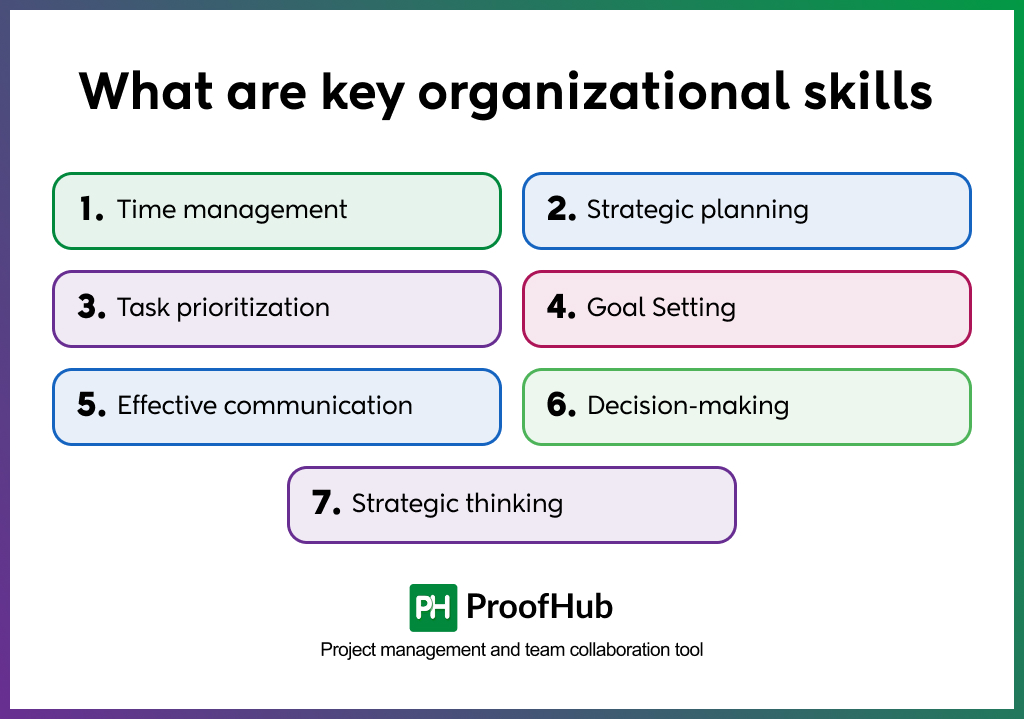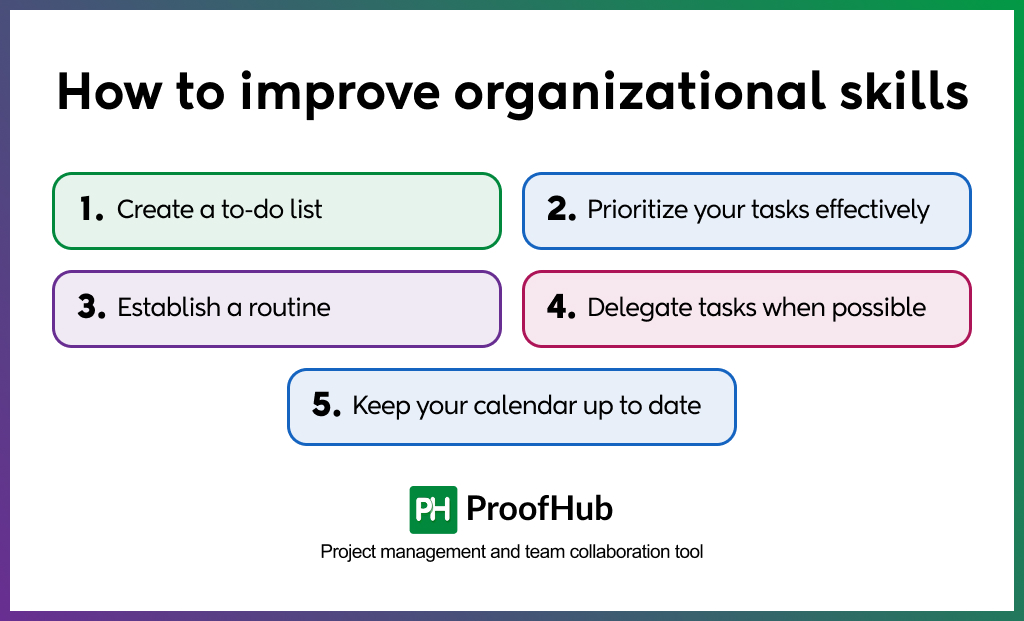Organizational skills refer to a set of abilities, such as time management, task prioritization, and communication that help bring structure to daily responsibilities, team management, and long-term projects. These skills are crucial because they enable managers to stay focused on high-impact activities, meet deadlines, and drive better collaboration. You can improve such skills by practicing goal setting, delegating tasks clearly, and using systems to track progress consistently.
For example, imagine a team handling multiple client projects with tight deadlines. A manager with strong organizational abilities would break down tasks by priority, set clear milestones, assign responsibilities based on strengths, and maintain visibility through planning tools. This not only ensures smoother execution but also prevents team burnout and missed deadlines.
In this article, you’ll get to explore each of these key organizational skills, how to improve them, and how they ultimately improve productivity and efficiency in depth.
What are organizational skills?
Organizational skills are the abilities that help you manage your time, structure your tasks, and achieve goals with focus and efficiency. These skills are important in both professional and personal lives of managers.
In the workplace, being organized enables managers and professionals to handle complex responsibilities, keep projects on track, and make well-informed decisions. It can also set you apart in today’s competitive job market, as you will become a reliable and efficient individual who has strong decision-making skills.
Beyond workplace, staying organized can significantly improve the quality of your life, making the difference between chaos and harmony. It helps you maintain a balanced and stress-free routine, and you can easily find time for the things that matter the most to you.
Why organizational skills are important?
Organizational skills enable you to manage your time, resources, and responsibilities more effectively, leading to increased productivity and less stress. They are essential for setting and reaching goals, prioritizing tasks, and staying focused, all of which contribute to a more balanced, efficient, and fulfilling life.
What are the key organizational skills?
The organizational skills are practical abilities that help you keep your productivity high and allow you to complete your tasks with great efficiency. These skills involve processes for keeping work organized, prioritized, and measurable, enabling individuals to complete tasks efficiently and on time.

The following are some of the every manager should develop:
1. Time management
It involves planning, prioritizing, and allocating your time effectively so tasks are completed without unnecessary delays and stress. Time management is not about doing more things in less time; it is about doing the right things at the right time. When managed well, it can improve collaboration, stay focused on high-impact activities, and ensure deadlines are met.
2. Strategic planning
Strong planning skills support better decision-making, which is crucial to keep employees organized and stay on top of their workload and meet deadlines. It involves setting clear objectives and outlining steps to achieve them. A well-structured plan can help you stay focused, allocate resources efficiently, and minimize uncertainty.
3. Task prioritization
Task prioritization is the ability to identify what needs your attention first and what can be scheduled for later. It’s about aligning your workload with deadlines, goals, and overall impact. For managers, this skill is crucial to prevent getting lost in a pile of daily tasks. It involves evaluating the urgency and importance of each task, estimating the time and resources required, and sequencing tasks to maximize efficiency and output. Prioritization supports better time management, reduces stress, and allows you to consistently meet your goals without burnout.
4. Goal Setting
Goal setting is an organizational skill that can help improve team efforts, improve performance, and achieve desired outcomes. It involves defining SMART goals (specific, measurable, achievable, relevant, and time bound to develop a plan to reach them. Effective goal setting plays a huge role in the tracking process, identifying performance gaps, and making informed adjustments along the way.
5. Effective communication
Communicating your ideas, thoughts, and opinions in a way that others can understand easily is crucial for an organization’s success. It involves the transmission of information clearly, effectively and adapting to the communications style of the listeners. This ensures that messages are understood as intended and promotes positive relationships within the organization.
6. Decision-making
Managers who are organized are skilled decision makers, which allows them to take optimal action on potential problems. It involves assessing situations, analyzing different options, and choosing the best possible way to achieve the organizational goals. It serves different benefits such as minimizing delays and boosting operational efficiency.
7. Strategic thinking
Strategic thinking is a problem-solving skill that helps you analyze different solutions deeply and come up with solutions. This skill can help you make informed decisions that align with long-term goals. This approach goes beyond ordinary problem-solving; it is helpful in organization’s sustainable growth.
How to improve organizational skills?
Development and improvement of organizational skills is a gradual process, you can’t achieve or improve it in one day. You can be highly organized one day and quite different the next. When you develop better skills, it can boost productivity levels and create successful long-term outcomes. It doesn’t matter whether you handle a personal task or manage the team; these responsibilities can help you maintain control over responsibilities.

The following are some of the ways that can help you improve your organizational skills-
- Create a to-do list: Creating a to-do list is one of the easiest yet most effective methods to improve your organizational skills, as you can arrange and record all of your tasks according to the upcoming deadlines. You can create an effective to-do list by:
- Defining goals and making sure that these goals are SMART (specific, measurable, achievable, relevant, and time-bound)
- Break down larger projects into smaller and manageable steps
- Assign estimated timeframes or deadlines to each task
When you keep your to-do list organized and updated, you can never forget important things. It can help you track progress and keep focused, so you can easily prevent task overload.
- Prioritize your tasks effectively: Priortizing the tasks at hand can help you focus on things that require immediate attention. In this way, you can filter which tasks need to be completed straight away and which can be postponed. The Eisenhower matrix is an effective method to:
- prioritize your tasks based on importance and urgency, so you can prevent low-priority activities from distracting you.
- When you categorize your tasks into four quadrants like Do, Schedule, Delegate, and Delete, it enables you to focus on what truly matters and manage your time and energy effectively.
This way, you can put your energy towards the most essential activities so you can manage stress while being productive.
- Establish a routine: An organized lifestyle is only achievable when you have a daily routine which includes setting deadlines to break down large projects in accordance with your daily routine. You need to create a regular timetable which matches your job duties and commitments, and allocate specific activities so you can sustain balance throughout your work and life. You can create a routine by:
- Use a physical planner or digital calendar to map out your day
- Block time for specific tasks or activities of work
- Build buffer time for unexpected issues
- Set boundaries for work and personal time to maintain balance
Sticking to a routine not only keeps your work on track but also helps you build momentum and stay focused throughout the day.
- Delegate tasks when possible: Delegation is a powerful tool for improving organizational skills, allowing individuals to manage their time and workload more effectively while promoting team development. By entrusting tasks to others, individuals can focus on higher-priority work, improve their time management, and empower their team members. To delegate tasks effectively:
- Match tasks with team member’s strengths and availability
- Provide clear instructions, expectations and deadlines
- Use project management and team collaboration software like ProofHub to plan, collaborate, track, and deliver tasks seamlessly
Delegation allows you to manage your workload more efficiently while fostering team trust and accountability.
- Keep your calendar up to date: Keeping your calendar up-to-date is a fundamental step in improving organizational skills. By consistently updating your calendar, you can effectively manage your time, prioritize tasks, and reduce stress, ultimately leading to increased productivity and a better work-life balance. Here’s how to make the most of your calendar:
- Choose a tool like ProofHub that fits your workflow (digital or physical)
- Use time-blocking to group similar tasks together
- Schedule everything—including breaks, meetings, and deep work
- Review and adjust weekly to reflect changing priorities
An updated calendar keeps your time structured and your mind clear, making it easier to stay in control.
Organizational skills examples
You must be aware that reading about something is completely different from implementing it. As a manager, it’s your job to manage complex projects, lead a team, and stay on top of your job responsibilities. Applying these organizational skills in a real-world situation can be difficult because you need to determine where their true value shows.
Following are some of the examples to show how organizational skills come to life in everyday work, helping you stay structured, lead with clarity, and drive meaningful results from your teams.
1. Time management
As someone responsible for assigning different tasks to your team so you can deliver projects on time, you need to fulfil project deadlines and attend client meetings. When you time block your calendar, setting time aside for deep-focus periods, you can ensure that the high-priority tasks are completed without the daily meetings and emails derailing your momentum. When you keep your time bound to certain tasks, you end up delivering more projects on time without working overtime.
2. Strategic planning
Let’s understand it from a scenario, if you are launching a new product feature, you need to know what activities to do first for an effective execution. That’s when you create a clear objective, which entails objectives, milestones, resource allocation, and risk mitigation. This results in giving your team more direction, no rework, and aligning their energy towards a measurable outcome.
3. Task prioritization
Have you ever seen your to-do list with more than ten tasks, and you don’t know which one to approach first? You need to priortize your tasks to resolve this problem. Rather than tracking them in order, you need to evaluate them according to their urgency, dependency, and deadlines. You can always delegate the low-impact ones and always work on high-impact activities. Prioritization helps you meet critical goals without exhaustion and gives clarity to your day.
4. Goal setting
When your team’s performance dips or deadlines are missed, unclear goals are often the cause. To fight such problems, you can always plan a meeting in which you can help them set SMART goals. It could be reducing turnaround time, onboarding new clients or some other things. These goals give everyone a direction, help track progress, and hold the team accountable through weekly check-ins.
5. Effective communication
You must have gone through situations where you told your team to do something else, but they ended up doing something other, leading to errors, lost time, and a project brief. To avoid this in future, you need to establish a practice where you confirm key points at the end of a meeting, using visual project boards, and create your communication style to suit your team member’s preferences. When clarity improves, collaboration also enhances.
6. Decision-making
Decision-making is a daily part of management whether it’s allocating budget or setting delivery dates. A thoughtful decision process involves gathering data, consulting with stakeholders, evaluating risks, and choosing the most strategic path. For example, when selecting between two project timelines, considering long-term client impact and team workload helps ensure sustainable success.
7. Strategic thinking
Strategic thinking allows you to see beyond daily operations and spot opportunities others might miss. Rather than reacting to short-term problems, you analyze market trends, gather customer feedback, and shape long-term solutions. For instance, by recognizing a shift in user behavior, you might propose repositioning a product, helping the business stay competitive.
What tools can help improve organizational skills?
Relying solely on memory or manual methods can quickly lead you to more chaos. You can become more organized by using project management tools like ProofHub, which allows managers to break down large projects into manageable tasks, assign responsibilities, set deadlines, and track progress from one centralized place. These tools can help you reduce confusion and make collaboration easier and smoother, especially in remote and hybrid work settings.
Also, this tool has several features like time tracking, note making, calendar, and multiple integration, so you can plan effectively, stay organised, and retrieve information quickly when it matters the most.
How do organizational skills improve productivity and efficiency?
Organizational skills help managers improve workplace productivity and efficiency by allowing them to execute tasks without wasting time, energy and resources. When you can easily plan your day, priortize your responsibilities, and keep track of progress, so that there will be no last-minute surprises and missed deadlines. This often leads to better time management, reduced stress, and clear focus. Eventually, the team can deliver high-quality work consistently.
Conclusion
Organizational skills are more than just professional strengths they’re the foundation for clarity, consistency, and confident decision-making in an otherwise chaotic work environment. When managers master skills like time management, strategic project planning, and effective communication, they don’t just improve their efficiency, they also empower their teams to perform at their best.
As leadership expert Stephen Covey once said, “The key is not to prioritize what’s on your schedule, but to schedule your priorities.” With the right tools, mindset, and consistent effort, you can transform how you manage tasks, teams, and time by creating a workplace that thrives on structure, not stress.

